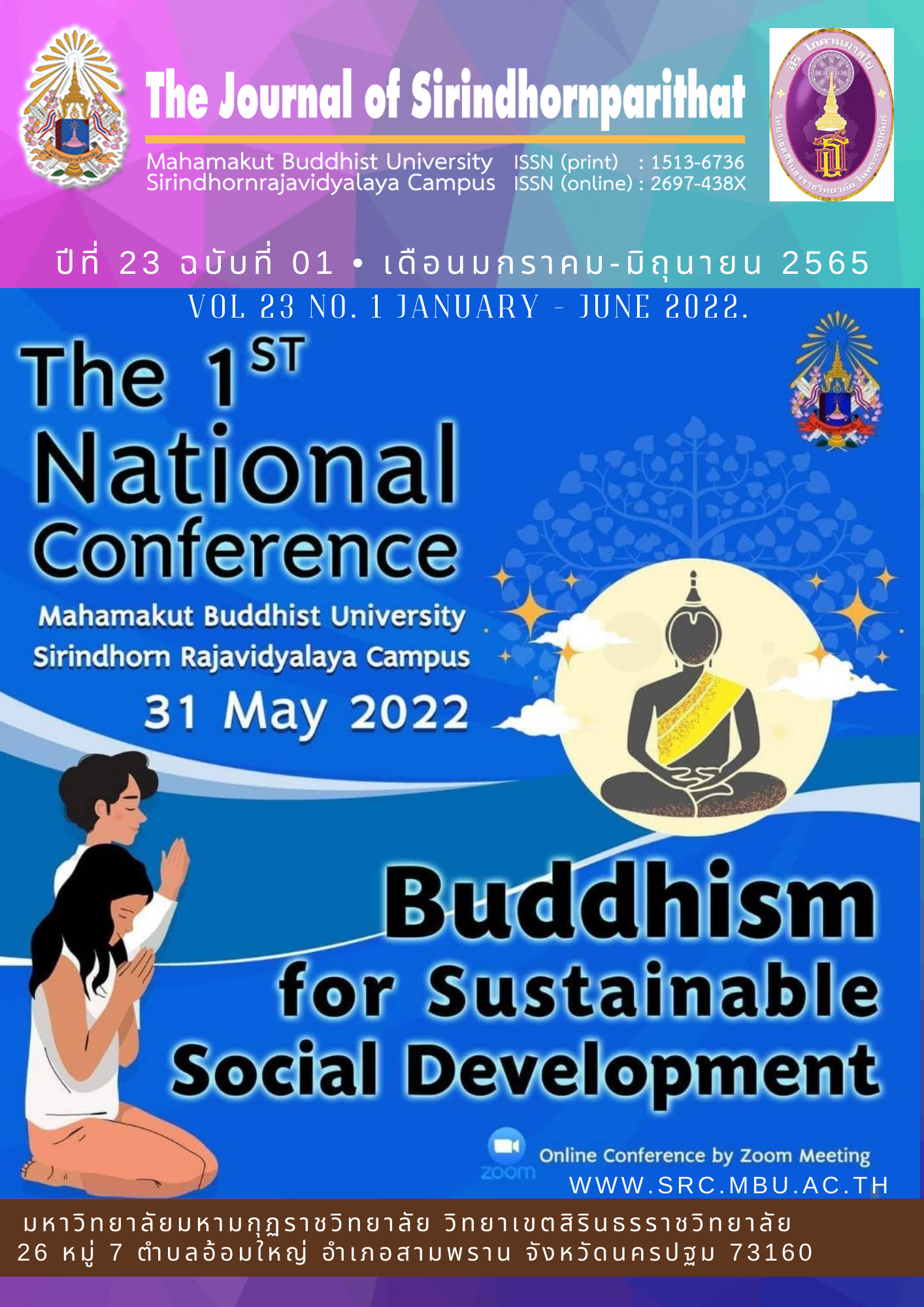สื่อสังคมออนไลน์กับพื้นที่สาธารณะของประชาธิปไตยแบบร่วมไตร่ตรอง
Keywords:
social media, collective democracy, public spaceAbstract
A reflective democracy claims that political decisions should be the result of fair and reasonable discussion and debate among a wide range of people. through this conversation People can reach an agreement on procedures, actions or policies that will best serve the public interest. Rather than think of political decisions as the sum of civic preferences. A reflective democracy claims that people should make rational political decisions and a free and rational gathering of competing arguments and views. If we look at social media, we will find that social media is a collective democracy. Because free access and the ability for everyone to contribute information empowers good political discourse online, it contributes to open debate based on inclusive democracy. The internet is still easily accessible and in theory. Anyone can publish information. This makes both participation and information acquisition independent of external influences. In particular, three important factors are Considering information that everyone has access to There is equality among the participants in the exchange of information. and there is the participation of people if many groups This article tends to believe that inclusive democracy can be found in the use of social media.
References
ชัยณรงค์ เครือนวน. (2557). ประชาธิปไตยแบบปรึกษาหารือในชุมชนท้องถิ่นไทย: ประสบการณ์จากภาคสนาม. วารสารเศรษฐศาสตร์การเมืองบูรพา, 2(2), 79-94.
เด่นพงษ์ แสนคำ และ พุทธรักษ์ ปราบนอก. (2563). ประชาธิปไตยแบบร่วมไตร่ตรอง : ว่าด้วยปัญญาของกลุ่มคนในวิกิพีเดีย. วารสารรัฐศาสตร์และรัฐประศาสนศาสตร์ มหาวิทยาลัยขอนแก่น, 5(2), 257-295.
Anspach, N. M., Jennings, J. T., & Arceneaux, K. (2019). A little bit of knowledge: Facebook’s News Feed and self-perceptions of knowledge. Research & Politics, 6(1), 1-9.
Aristotle (1998). The Politics. Translated by C.D.C. Reeve. Indianapolis: Hackett Publishing.
Bächtiger, A., Dryzek, J. S., Mansbridge, J., & Warren, M. E. (2018). The Oxford handbook of deliberative democracy. Oxford: Oxford University Press.
Bo’do, S., Siahaan, H., & Ida, R. (2019). Social Media, Public Sphere and Movement Discussion of Urban Farming in Indonesia. Budapest International Research and Critics Institute-Journal (BIRCI-Journal), 250-261.
De Vos, P., Freedman, W., & Brand, D. (2014). South African constitutional law in context. Oxford: Oxford University Press.
Di Gennaro, C., & Dutton, W. (2006). The Internet and the public: Online and offline participation in the United Kingdom. Parliamentary Affairs, 59(2), 299–313.
Fishkin, J. (2009). When People Speak: Deliberative Democracy and Public Consultation. Oxford: Oxford University Press.
Fishkin, J., & Luskin, R. (2005). Experimenting with a Democratic Ideal: Deliberative Polling and Public Opinion. Acta Politica, 40, 284–298.
Fuchs, C. (2012). The political economy of privacy on Facebook. Television & New Media, 13(2), 139-159.
Fuchs, C. (2014). Social media and the public sphere. tripleC: Communication, Capitalism & Critique. Open Access Journal for a Global Sustainable Information Society, 12(1), 57-101.
Gil de Zúñiga, H., Molyneux, L., & Zheng, P. (2014). Social media, political expression, and political participation: Panel analysis of lagged and concurrent relationships. Journal of communication, 64(4), 612-634.
Habermas, J. (1991). The Structural Transformation of the Public Sphere. An Inquiry into a Category of Bourgeois Society. Cambridge, MA: MIT Press.
Habermas, J. (1998). Between facts and norms: Contributions to a discourse theory of law and democracy (W. Rehg, Trans.). Cambridge, MA: MIT Press. (Original work published 1996).
Halpern, D., & Gibbs, J. (2013). Social media as a catalyst for online deliberation? Exploring the affordances of Facebook and YouTube for political expression. Computers in Human Behavior, 29(3), 1159-1168.
Janssen, D., & Kies, R. (2005). Online forums and deliberative democracy. Acta política, 40(3), 317-335.
Kwak, H., Lee, C., Park, H., & Moon, S. (2010, April). What is Twitter, a social network or a news media? In Proceedings of the 19th international conference on World Wide Web (pp. 591–600). Retrieved from http://dl.acm.org/citation.cfm?id=1772751.
Landemore, H. (2012). Democratic Reason. Princeton: Princeton University Press.
List, C., & Goodin, R. (2001). Epistemic Democracy: Generalizing the Condorcet Jury Theorem. Journal of Political Philosophy, 3, 277–306.
Loader, B. D., & Mercea, D. (2011). Networking democracy? Social media innovations and participatory politics. Information, communication & society, 14(6), 757-769.
Loeper, A. (2017). Cross-border externalities and cooperation among representative democracies. European Economic Review, 91, 180-208.
Macintosh, A. (2004). Characterizing e-participation in policy-making. In Proceedings of the 37th annual Hawaii international conference on system sciences. Big Island, HI: Computer Society Press.
Maly, I. (2018). Facebook and the end of the public sphere. Retrieved March 6, 2022 (https://www.diggitmagazine.com/articles/facebook-strangle-media-2018-undermine-democracy).
Marti, J. (2006). The Epistemic Conception of Deliberative Democracy Defended: Reasons, Rightness, and Equal Political Autonomy. In S. Besson, & J. Marti (Eds.), Deliberative Democracy and its Discontent (pp. 27–56). Burlington, VT: Ashgate.
Min, J. B., & Wong, J. K. (2018). Epistemic approaches to deliberative democracy. Philosophy Compass, 13(6), 1-13.
Pew Research Center. (2012). “Social Networking Popular Across Globe.” Retrieved October 6, 2016 (http://www.pewglobal.org/2012/12/12/social-networking-popular-across-globe/).
Rawls, J. (1971). A Theory of Justice. Cambridge, MA: Harvard University Press.
Shah, D. V., Cho, J., Eveland, W. P., & Kwak, N. (2005). Information and expression in a digital age modeling Internet effects on civic participation. Communication Research, 32(5), 531–565.
Stromer-Galley, J., & Wichowski, A. (2011). Political discussion online. The handbook of Internet studies, 11, 168-187.
Threlkeld, S. (1998). A blueprint for democratic law-making: give citizen juries the final say. Social Policy, 28(4), 5-10.

Downloads
Published
Issue
Section
License
Copyright (c) 2022 Mahamakut Buddhist University

This work is licensed under a Creative Commons Attribution-NonCommercial-NoDerivatives 4.0 International License.
บทความที่ได้รับการตีพิมพ์เป็นลิขสิทธิ์ของ มหาวิทยาลัยมหามกุฏราชวิทยาลัย วิทยาเขตสิรินธรราชวิทยาลัย
ข้อความที่ปรากฏในบทความแต่ละเรื่องในวารสารวิชาการเล่มนี้เป็นความคิดเห็นส่วนตัวของผู้เขียนแต่ละท่านไม่เกี่ยวข้องกับหาวิทยาลัยมหามกุฏราชวิทยาลัย วิทยาเขตสิรินธรราชวิทยาลัย และคณาจารย์ท่านอื่นๆในมหาวิทยาลัยฯ แต่อย่างใด ความรับผิดชอบองค์ประกอบทั้งหมดของบทความแต่ละเรื่องเป็นของผู้เขียนแต่ละท่าน หากมีความผิดพลาดใดๆ ผู้เขียนแต่ละท่านจะรับผิดชอบบทความของตนเองแต่ผู้เดียว



